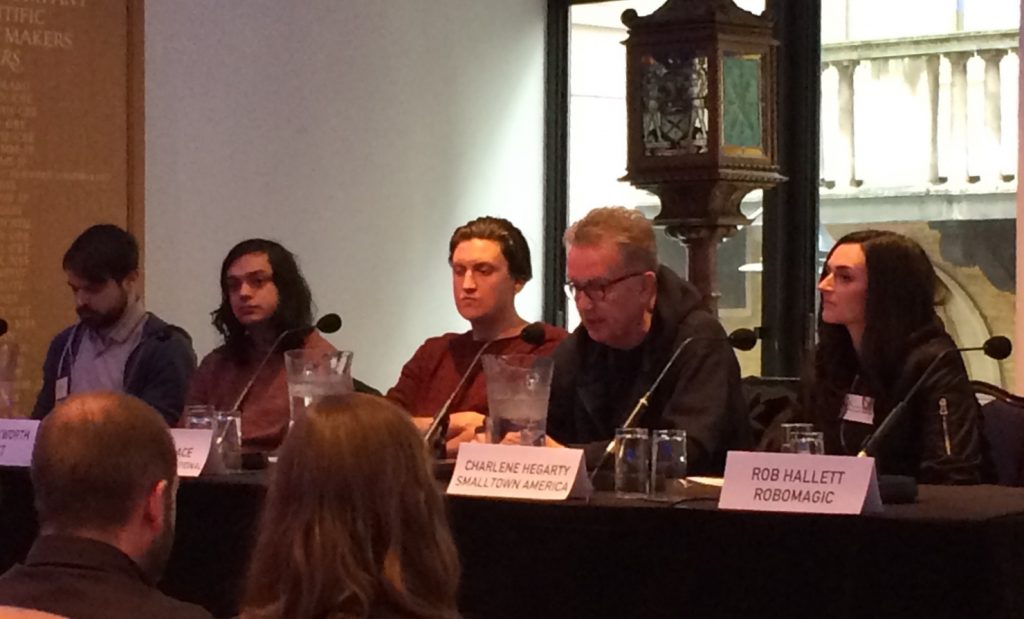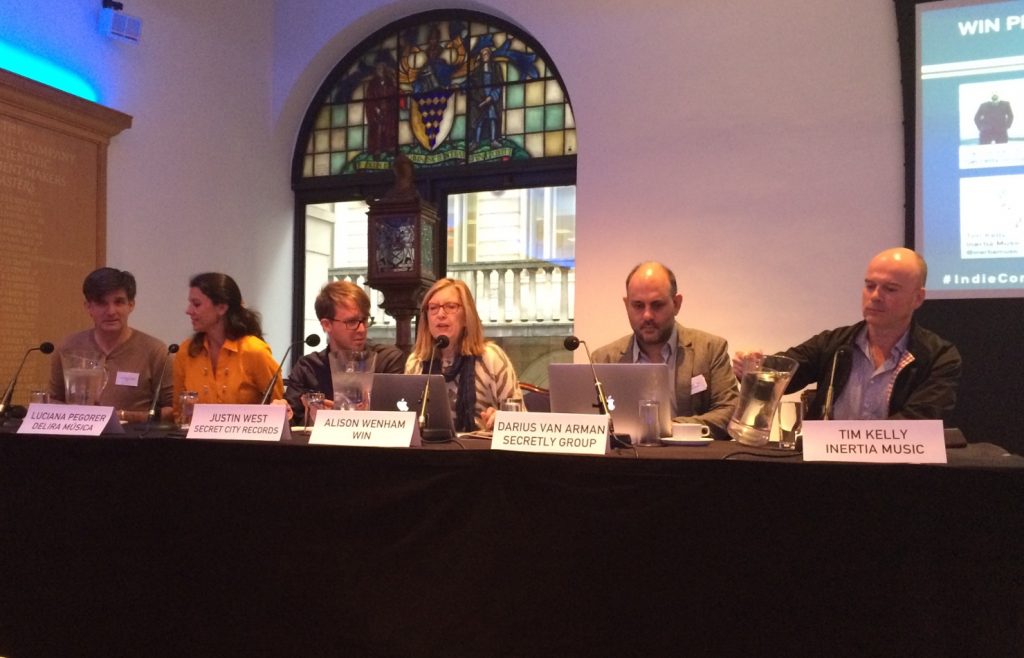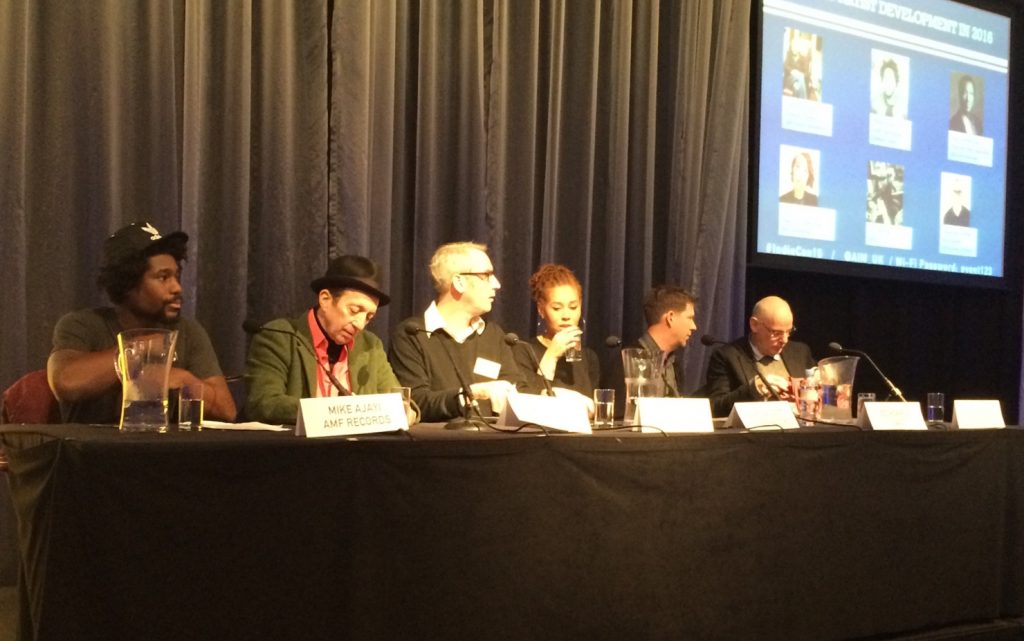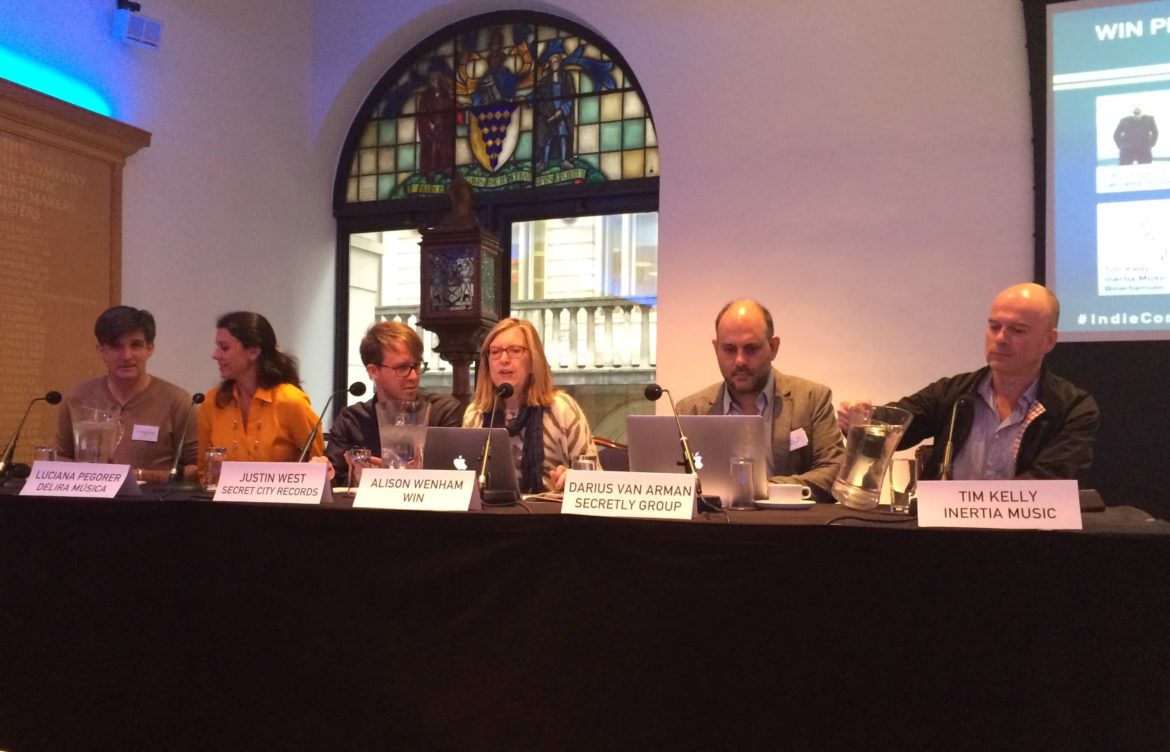Last week AIM hosted its annual Indie Con, which was widely attended by delegates from all sides of the indie market. The overall consensus from the panels we attended was that it is a challenging, yet exciting time to be an independent in the business. Here are some of our key takeaways:
We need to think like the games and digital video industries
Following on from his speech at the last Indie Con (covered on our blog), Music Business Worldwide founder Tim Ingham kicked off the conference by comparing the music business to other industries in the creative sector.
Beginning with a photo of a bottle of piss belonging to indie games developer Jonathan Blow, Ingham encouraged the room to “Story-fy” their releases. So committed to his work on new game The Witness, Blow tweeted the photo to suggest that he didn’t even have time for a toilet break, thus making him somewhat of a hero to his audience.
“What I’d like to ask you is when you put out an album, what are you telling gatekeepers or the public about the people who made it?” asks Ingham. “Why should we give a shit? Where is their bottle of piss?”
He then encouraged indie labels to take the money and run, by challenging digital service providers (Spotify, Apple, etc.) to give indie creations a home in exchange for a one-time, large upfront payment, in the same way that Netflix and Amazon Prime, for example, are acquiring their original content. According to Ingham, indie music creators need to set up a marketplace, similar to the Independent Games Festival in San Francisco, where large developers like Sony and Microsoft search for new and exciting ideas, which they then take ownership of for a large fee.
“Your role”, explains Ingham, “becomes discovering the artist, developing the artist, and then selling the product wholesale exclusively to those channels.” You get a huge payment upfront, and the DSP gets a spike in their revenues and subscribers, just as Netflix did when it began to pay for its own IP with House of Cards.
Lastly, Ingham encouraged the streaming services to experiment with pricing, just as Netflix and other services have done, echoing Mark Mulligan’s recent post, “The Music Industry Is Forcing Consumers To Choose Between Buying a Lexus And Taking The Bus.”
Records are simply a gateway to ancillary revenue streams
It’s hardly a surprise to hear that record sales are no longer proving a key income stream for labels. As Dave Wallace of The League International explains during the ‘How Are Artists Making Money in 2016?’ panel, “music has become the fishhook to earning ancillary revenues, rather than the driving revenue force in the game we’re playing,” with more emphasis being placed on ticketing, merch, sync, and so on. “Records now are more like adverts for you as a product”, added Robomagic’s Rob Hallett.
As an indie, it’s more important than ever to cut the fat and streamline your operation as much as possible. “It’s really important to streamline your focus on particular areas that may be more inclined to deliver the results that you’re after”, said Charlene Hegarty, founder of Synchtank client Smalltown America.
Hegarty went on to explain that playlisting on digital sites such as Spotify, and the analytics derived from this, have been instrumental in giving her artists exposure, as well as helping the company to know which territories to focus on. “With one artist we decided which territories we wanted to tour in based on the Spotify analytics.” Despite providing very little income, the panel agreed that streaming services are a useful tool to leverage.
Sam Duckworth (aka Get Cape. Wear Cape. Fly) made a valid point in his concern at the panel’s lack of emphasis on the art itself. “The most important element of why this industry exists is the records”, he said. “I think if we continue to put a stranglehold on the creative process by looking at records as adverts for brand partnerships, we’re going to lose the quality that brought people to the table in the first place.”

L-R: Matt Walker (Raygun Music), Sam Duckworth (Get Cape. Wear Cape. Fly), Rob Hallett (Robomagic), Dave Wallace (The League International), Tom Robinson (BBC 6Music), Charlene Hegarty (Smalltown America), Rob Hallett (Robomagic).
Indie labels managers have to wear many hats
Echoing the sentiments expressed in the previous panel, Indie-Con’s most popular session ‘Running a great small label’ clearly showed that labels are having to diversify their income streams as much as possible, and take on more roles than ever before. Vinita Joshi of Rocket Girl Records spoke of the benefits of also representing the publishing side to make sync clearances easier (providing a “one-stop shop”), describing a time when she lost around $150,000 because the publishers representing a track wouldn’t clear it for the US.
Small is powerful
It’s clear from the panel that instead of a hindrance, being small is incredibly powerful if you make use of it. “As a record label I think it’s important that you don’t feel pressured into expanding and diversifying”, says Robert Raths of Erased Tapes. “I think it’s very important, especially as a small label, to only do things that are actually benefitting the collective.”
“You see labels grow to a point where they lose what was good about them in the first place”, explains Adam Scrimshire (Wah Wah 45s), who instead advises labels to manage their expectations and “be honest with themselves about what they think they can achieve, and how big they think they can be.” In order to succeed, small labels need to understand what’s unique about them, and always try to retain whatever that is.
It’s a great time to be an indie in the global marketplace

L-R: Horst Weidenmueller, (!K7 Records – Germany), Luciana Pegorer (Delira Musica – Brazil), Justin West (Secret City Records – Canada), Alison Wenham (Worldwide Independent Network), Darius Van Arman (Secretly Group – USA), Tim Kelly (Inertia Music – Australia).
Chaired by WIN’s Alison Wenham, ‘The Global Indepedent Market’ panel brought us indie professionals from Germany, Brazil, Canada, UK, USA, and Australia. Although the market remains incredibly disruptive, there’s a lot of positivity among the panelists about the current international landscape. “I think we have more opportunities today than we’ve ever had as small/medium sized companies to release music on a global stage”, says Darius Van Arman of Secretly Group. “I think it’s the best time to be independent”, agrees Luciana Pegorer of Delira Music.
There’s a definite consensus that the indie community is getting stronger, and more supported by trade bodies such as WIN and Merlin. “They (the trade bodies) create a lot of efficiencies for smaller organisations to help them play the global game, and it takes a huge weight off a small companies’ back,” says Justin West of Canadian label Secret City. Luciana Pegorer, who primarily deals with her home territory of Brazil, says these organisations help her to “participate in the big picture.”
It’s clear from the panel that a sense of independent spirit is what differentiates small organisations from the majors. “From my perspective, what distinguishes us from the big multi-national companies is that we embrace competition and open systems”, says Darius Van Arman. “Independence is this idea that you’re very comfortable with competition, you’re very comfortable with living or dying by your decisions and investments, and all you want is a level playing field.” The independent sectors’ biggest challenge, therefore, is to coordinate efforts effectively to ensure a fair share of opportunities in the global marketplace.
A&R isn’t just about numbers, even in 2016

L-R: Mike Ajayi (AMF Records), Tom Silverman (Tommy Boy Records), Eamonn Forde (Freelance Journalist), Jamila Scott (Method Records), Ed Horrox (4AD), Geoff Travis (Rough Trade Records).
During the ‘A&R and Artist developement in 2016’ panel, it was refreshing to hear that A&R is not just about finding a “sure thing” based on social followings, streams, Shazam figures, etc. Mike Ajayi describes signing alt-J despite the band having practically no following or online presence: “I went to their gig at The Victoria in Dalston, and there were 100 people there. They only had about 100 fans on Facebook, there was hardly any social media going on and they didn’t show their faces, but it was based on a gut instinct for me.”
“Numbers are irrelevant when we try to sign someone”, says Rough Trade’s Geoff Travis. “I try to avoid numbers seven days a week. I know they can be important in the pop arena, but with what we’re doing it’s about finding people relatively early because we’re not interested in bidding wars and fighting other labels for artists.”
Tommy Boy Records founder Tom Silverman explains that he tends to look for music that defies categorization, because “when you get put in a box, it limits your potential.”
A&R shouldn’t be about pressure or interference
A&R is obviously a results driven process, with a large degree of pressure from above to get things done on time, on budget, and of course, above all, to achieve success. It’s important, however, for A&R reps to avoid letting this pressure affect their working relationship with an artist. “You don’t want to put out a record that you know is half cooked and not how it was intended to be just for the sake of getting a strong midweek, or trying to fill a hole in a release schedule”, explains Mike Ajayi.
On not over-interfering with the artistic process, Geoff Travis quotes Atlantic records co-founder Ahmet Ertegun: “All you need to do as an A&R person is find a genius and then walk 10 feet behind them.”
Thanks to AIM for hosting another informative and enjoyable Indie Con – we look forward to the next one! Don’t forget, you can check out the highlights of the keynote conversation with industry icon Seymour Stein at Indie Con 2016 here.
